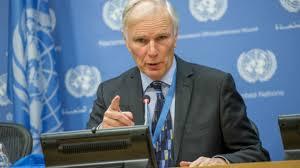
Full report
https://chrgj.org/wp-content/uploads/2020/07/Alston-Poverty-Report-FINAL.pdf
SUMMARY
This report is submitted by Philip Alston.
The world is at an existential crossroads involving a pandemic, a deep economic recession, devastating climate change, extreme inequality, and an uprising against racist policies. Running through all of these challenges is the longstanding neglect of extreme poverty by many governments, economists, and human rights advocates.
By single-mindedly focusing on the World Bank’s flawed international poverty line, the international community mistakenly gauges progress in eliminating poverty by reference to a standard of miserable subsistence rather than an even minimally adequate standard of living.
This in turn facilitates greatly exaggerated claims about the impending eradication of extreme poverty and downplays the parlous state of impoverishment in which billions of people still subsist. While the Sustainable Development Goals have achieved a great deal, they are failing in relation to key goals such as poverty eradication, economic equality, gender equality, and climate change.
They need to be recalibrated in response to COVID-19, the ensuing recession, and accelerating global warming. Poverty is a political choice and its elimination requires: (i) reconceiving the relationship between growth and poverty elimination; (ii) tackling inequality and embracing redistribution; (iii) promoting tax justice; (iv) implementing universal social protection; (v) centering the role of government; (vi) embracing participatory governance; and (vii) adapting international poverty measuremen
Philip G. Alston is an Australian international law scholar and human rights practitioner. He is John Norton Pomeroy Professor of Law at New York University School of Law, and co-Chair of the law school's Center for Human Rights and Global Justice
A very interesting article on the reportpublished by The Guardian. In this article Philip Alston criticizes also the role of private sector in achieving the SDGs.
https://www.theguardian.com/global-development/2020/jul/07/we-squandered...
https://www.ohchr.org/en/issues/poverty/pages/srextremepovertyindex.aspx
Ending poverty by 2030 now a fading dream, says UN expert
GENEVA (7 July 2020) – The global COVID-19 pandemic has pushed more than 250 million people to the brink of starvation and dashed hopes of eradicating extreme poverty by 2030, a UN expert says in a report published today.
The report, to be presented to the UN Human Rights Council today by Olivier De Schutter, Special Rapporteur on extreme poverty and human rights, was prepared by his predecessor Philip Alston. It criticises the way governments have banked on economic growth to lift people out of poverty. It says the UN's 2030 Agenda to eradicate poverty through Sustainable Development Goals (SDGs) relies too much on a poverty line set so low by the World Bank that it allows governments to claim progress where there is none.
The report states that the pandemic will push 176 million more people into extreme poverty, compounding long-standing neglect of low-income people, including women, migrant workers and refugees. The international community's abysmal record on tackling poverty, inequality and disregard for human life far precede this pandemic, the report says.
"Many world leaders, economists, and pundits have enthusiastically promoted a self-congratulatory message, proclaiming progress against poverty to be one of the greatest human achievements of our time," the report says. "The reality is that billions face few opportunities, countless indignities, unnecessary hunger and preventable death, and do not enjoy basic human rights."
"In too many cases, the promised benefits of growth either don't materialise or aren't shared," the report says. "The global economy has doubled since the end of the Cold War, yet half the world lives under $5.50 a day, primarily because the benefits of growth have largely gone to the wealthiest."
The world needs new strategies, genuine mobilisation, empowerment and accountability "to avoid sleepwalking towards assured failure while pumping out endless bland reports", the report says. Tax justice is key to ensure governments have the money needed for social protection: in 2015, multinationals shifted an estimated 40 percent of their profits to tax havens, while global corporate tax rates have fallen from an average of 40.38 percent in 1980 to 24.18 percent in 2019. De Schutter also called for establishment of a social protection fund to help countries give the poorest basic social security guarantees.
"Growth alone, without far more robust redistribution of wealth, would fail to effectively tackle poverty," said De Schutter. "Based on historic growth rates, it would take 200 years to eradicate poverty under a $5 a day line and would require a 173-fold increase in global GDP." That, he added, is "an entirely unrealistic prospect, not least since it does not take into account the environmental degradation associated to the economic growth, or the impacts of climate change on poverty itself".
"I welcome this report, which illustrates that poverty is not a matter only of low incomes," said De Schutter. "It's a matter of disempowerment, of institutional and social abuse, and of discrimination. It is the price we pay for societies that exclude people whose contributions are not recognised. Eradicating poverty means building inclusive societies that shift from a charity approach to a rights-based empowering approach."
De Schutter will also present the reports of his predecessor's visits to Malaysia and Spain.
ENDS
Mr. Olivier De Schutter (Belgium) is the UN Special Rapporteur on extreme poverty and human rights. He took up his functions in May 2020. Mr. De Schutter is a Professor of Law at UCLouvain and at SciencesPo (Paris). He was the Special Rapporteur on the right to food from 2008 to 2014, and a member of the Committee on Economic, Social and Cultural Rights between 2015 and 2020.
The Special Rapporteurs are part of what is known as the Special Procedures of the Human Rights Council. Special Procedures, the largest body of independent experts in the UN Human Rights system, is the general name of the Council's independent fact-finding and monitoring mechanisms that address either specific country situations or thematic issues in all parts of the world. Special Procedures experts work on a voluntary basis; they are not UN staff and do not receive a salary for their work. They are independent from any government or organisation and serve in their individual capacity.










Add new comment